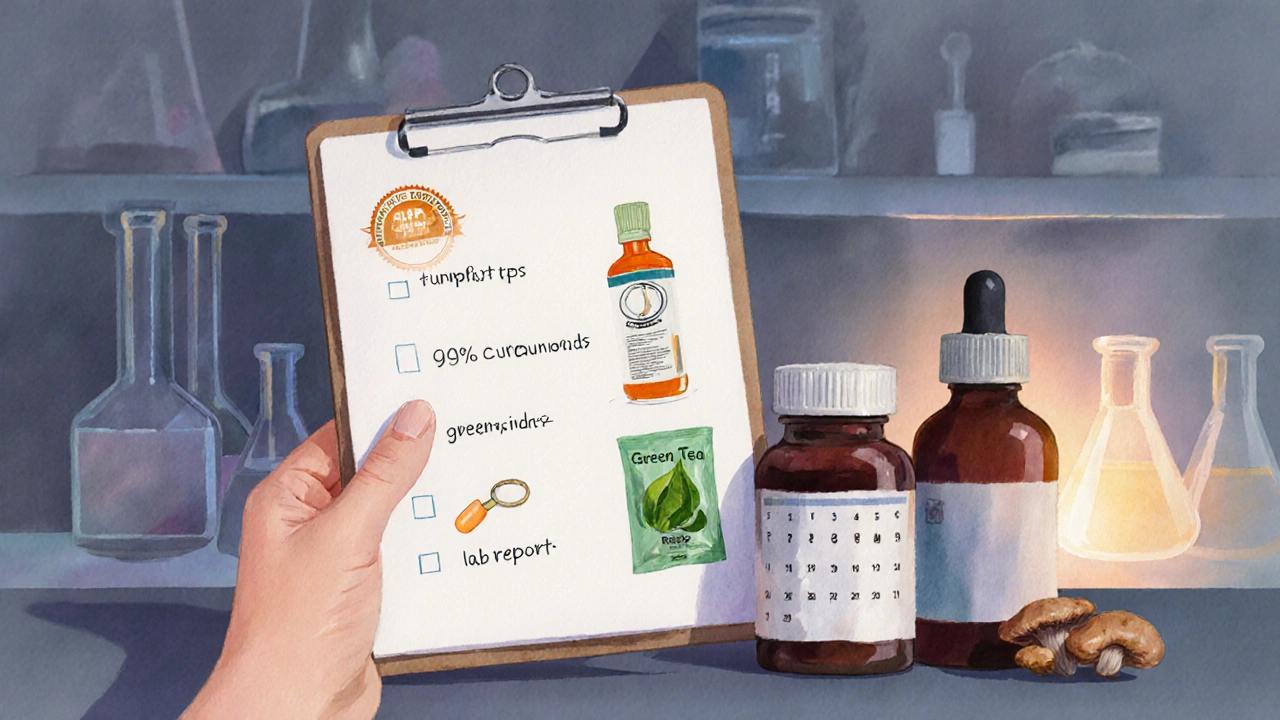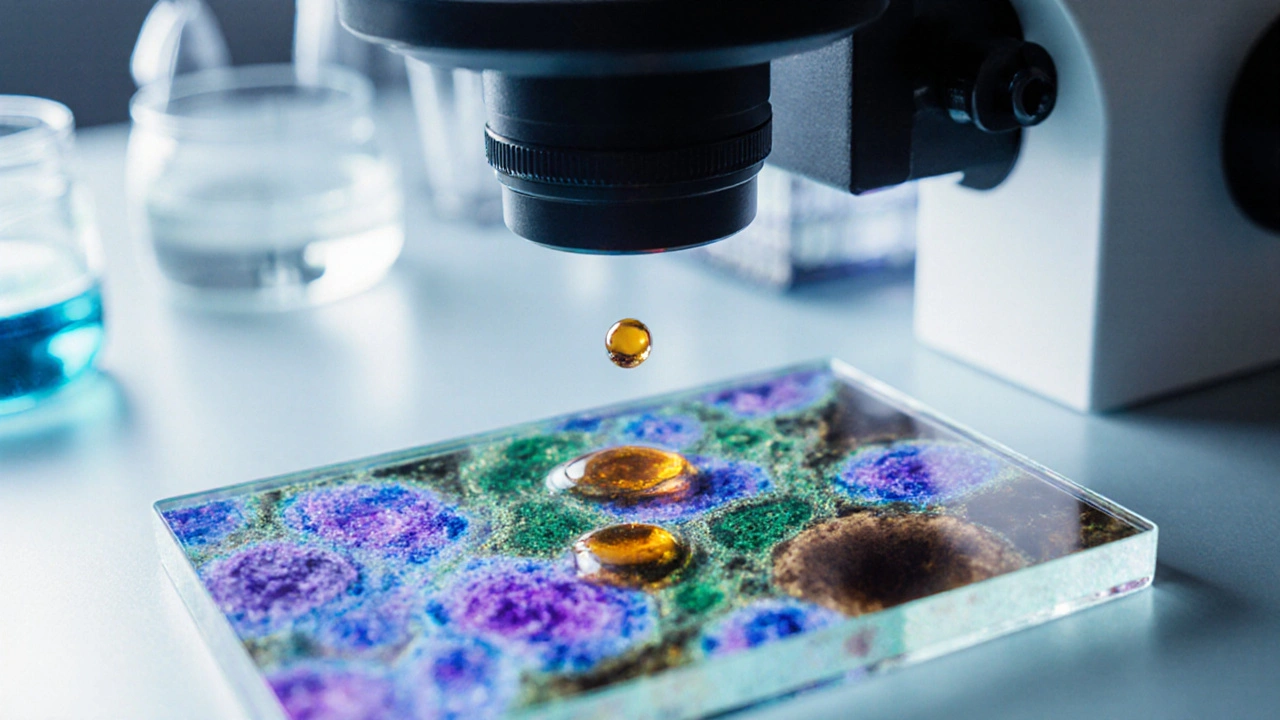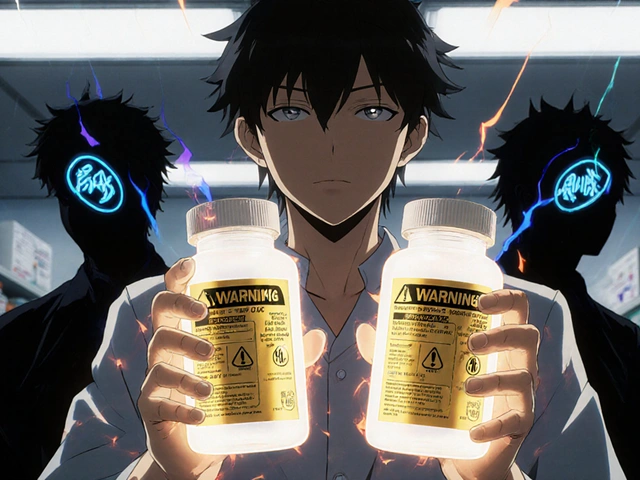Myeloma Herbal Medicine Checker
This tool helps you assess the safety and potential interactions of common herbal supplements used by multiple myeloma patients. Enter details below to get personalized guidance.
Evaluation Results
Enter information and click "Evaluate Safety & Interactions" to see personalized guidance.
When you hear myeloma herbal medicine, you probably wonder if plants can really help a disease as aggressive as multiple myeloma. This guide breaks down the science, the risks, and the realistic ways you might blend natural remedies with modern therapy.
Key Takeaways
- Multiple myeloma is a cancer of plasma cells that needs standard chemotherapy, immunotherapy, or stem‑cell transplant.
- Herbal compounds such as curcumin, green‑tea catechins, and medicinal mushrooms show lab‑level anti‑myeloma activity, but human data remain limited.
- Potential drug‑herb interactions are the biggest safety concern; always discuss supplements with your oncologist.
- Integrating herbs is best done as an adjunct, not a replacement, and with clear dosage and quality standards.
- A simple checklist can help you evaluate any herbal product before adding it to your regimen.
What Is Multiple Myeloma?
Multiple Myeloma is a malignant disease of plasma cells, the white‑blood cells that produce antibodies. It accounts for about 1% of all cancers and roughly 10% of blood‑cancer cases worldwide. Symptoms often include bone pain, anemia, high calcium levels, and kidney problems. Standard care involves a mix of proteasome inhibitors, immunomodulatory drugs, monoclonal antibodies, and autologous stem‑cell transplants.
Herbal Medicine in a Nutshell
Herbal Medicine refers to the use of plant‑derived extracts, powders, or whole herbs to prevent or treat illness. It spans traditional systems like Traditional Chinese Medicine and modern nutraceuticals. While many herbs have antioxidant or anti‑inflammatory properties, only a fraction have rigorous clinical validation for cancer.

Herbs Frequently Cited in Myeloma Research
Researchers have singled out a handful of botanicals for their laboratory activity against myeloma cells. Below is a quick snapshot.
| Herb / Compound | Key Active Ingredient | In‑vitro Effect | Human Data (if any) |
|---|---|---|---|
| Turmeric | Curcumin | Induces apoptosis, blocks NF‑κB signaling | PhaseII trial showed modest reduction in bone‑lesion markers (n=30) |
| Green Tea | Epigallocatechin‑3‑gallate (EGCG) | Inhibits angiogenesis, enhances bortezomib cytotoxicity | Small pilot (n=15) reported lower serum M‑protein levels |
| Reishi Mushroom | Ganoderic acids | Suppresses STAT3 pathway, reduces myeloma cell proliferation | No published clinical trial yet |
| Ginseng | Ginsenosides | Synergizes with dexamethasone, promotes cell‑cycle arrest | Case‑series of 8 patients showed stable disease for 6months |
| Resveratrol | Stilbene | Blocks PI3K/Akt signaling, enhances melphalan response | Pre‑clinical only |
How Strong Is the Scientific Evidence?
Most data sit at the bench‑research level. Curcumin, for instance, kills myeloma cells in petri dishes at micromolar concentrations, but its oral bioavailability is poor. Nano‑formulations and phosphatidylcholine complexes improve absorption, yet no large‑scale randomized trial has proved a survival benefit.
Green‑tea catechins have a more favorable pharmacokinetic profile, and early‑phase studies suggest they may sensitize cells to bortezomib. However, these studies are tiny, lack control groups, and often combine the herb with other supplements, making it hard to isolate effects.
Medicinal mushrooms like Reishi show promising immunomodulatory actions (e.g., boosting NK‑cell activity), but human trials for myeloma are still missing. The pattern is clear: exciting lab results, scant human proof.
Safety, Interactions, and Quality Control
Herbal products are not regulated the way pharmaceuticals are. Potency can vary wildly between batches, and contaminants (heavy metals, pesticide residues) are a real concern. When you add an herb to a myeloma regimen, watch out for two main risks:
- Pharmacokinetic interactions: Compounds like curcumin can inhibit CYP3A4, the enzyme that metabolizes many myeloma drugs (e.g., lenalidomide). This could raise drug levels and increase toxicity.
- Pharmacodynamic clashes: Some antioxidants may blunt the reactive‑oxygen‑species mechanism that drugs like melphalan rely on.
Before buying, verify that the supplement has:
- Third‑party testing (e.g., USP, NSF) for purity and label accuracy.
- Standardized extract content (e.g., 95% curcuminoids for turmeric).
- A clear dosage recommendation based on published studies.
Talking to Your Oncology Team
Doctors usually appreciate an open conversation. Bring these points:
- Exact product name, brand, and batch number.
- Current dosage and schedule.
- Any side effects you’ve noticed.
Ask whether the herb might interfere with your treatment plan. If the oncologist says “no,” get that in writing or via a follow‑up email. If they’re hesitant, request a referral to a clinical pharmacist who specializes in oncology‑related supplements.

Practical Integration Checklist
Use this short checklist whenever you consider an herbal addition.
- Confirm the herb has a standardized, third‑party‑tested product.
- Check reputable sources (PubMed, NCCIH) for any documented interactions with your meds.
- Start with the lowest studied dose and monitor blood work for liver/kidney markers.
- Document any new symptoms or changes in disease markers.
- Review the regimen with your oncologist every 4-6weeks.
Future Directions and Ongoing Trials
Several phaseII trials are recruiting patients to test curcumin‑based formulations as adjuncts to standard therapy. A UK‑based study (NCT04678901) will examine green‑tea extract’s effect on progression‑free survival. Keep an eye on ClinicalTrials.gov; many of these trials are still early, but they signal growing scientific interest.
Bottom Line
Herbal medicine offers intriguing biochemical tools that may support myeloma treatment, but they are far from a cure. The safest path is to treat herbs as complementary, not alternative, and to involve your medical team at every step. With careful selection, proper dosing, and vigilant monitoring, some patients find that certain botanicals help manage treatment‑related fatigue or improve quality of life.
Frequently Asked Questions
Can I replace chemotherapy with herbal remedies?
No. Current evidence supports herbs only as adjuncts. Skipping standard treatment sharply lowers survival odds.
Is curcumin safe to take with bortezomib?
Curcumin can inhibit CYP3A4, which metabolizes bortezomib. Talk to your oncologist; a low‑dose, well‑standardized product might be OK under close monitoring.
How do I know if a supplement is high quality?
Look for third‑party certifications (USP, NSF), a standardized extract statement (e.g., 95% curcuminoids), and a batch‑specific certificate of analysis.
Are there any herbs that have proven survival benefit?
As of 2025, no herbal product has demonstrated a statistically significant survival advantage in large, randomized trials for multiple myeloma.
What should I do if I experience side effects from an herb?
Stop the supplement immediately, document the reaction, and contact your oncology team. They may order liver or kidney labs to rule out toxicity.






Melissa Shore
October 8, 2025 AT 18:20The interplay between herbal supplements and myeloma therapies is a nuanced topic that deserves careful attention. Patients often hear promises about natural cures and feel hopeful. However the scientific evidence for most herbs remains limited to laboratory studies. Oral bioavailability of compounds such as curcumin is notoriously poor without specialized formulations. This reality means that even high‑dose supplements may not reach therapeutic levels in the bloodstream. Moreover the metabolic pathways for many myeloma drugs involve cytochrome enzymes that can be inhibited by phytochemicals. Inhibition can raise drug concentrations and increase the risk of adverse effects. The reverse is also possible where herbs speed up drug clearance and reduce efficacy. Safety concerns extend beyond interactions to product purity and contamination. Heavy metals, pesticide residues, and inconsistent dosing are documented problems in over‑the‑counter preparations. Patients are advised to seek third‑party testing certifications like USP or NSF. Discussing any supplement with the oncology team helps to weigh potential benefits against risks. A structured checklist can guide conversations and monitor lab parameters. Documentation of supplement use should be part of the medical record. Ultimately the safest approach treats herbs as adjuncts under professional supervision.
Maureen Crandall
October 9, 2025 AT 17:30You should stop taking any herbs until your doctor signs off.
Michelle Pellin
October 10, 2025 AT 16:39In the grand theater of oncology, the curtain rises on a delicate duet between cutting‑edge pharmacology and time‑honored botanicals. The stage is set with curcumin, a golden spice that pirouettes through cellular pathways, coaxing malignant plasma cells toward apoptosis. Green tea, with its verdant catechins, lends a subtle harmony, potentially amplifying the efficacy of proteasome inhibitors. Yet, as in any compelling drama, the plot twists arise from unforeseen interactions that may undermine the protagonist’s triumph. The audience, comprising patients yearning for agency, must be educated on the rigor-or lack thereof-behind each herbal interlude. While the script promises improved quality of life, the evidence remains a series of tantalizing footnotes rather than definitive acts. Clinical trials are the scholars’ quills that will rewrite this narrative with certainty. Until then, prudent caution and open dialogue with one’s medical cast remain the wisest counsel.
Keiber Marquez
October 11, 2025 AT 15:48its a big deal and we need american doctors to stop listening to foreign nonsense.
Lily Saeli
October 12, 2025 AT 14:58We must remember that health is a moral responsibility, not a playground for experimental whims. Choosing supplements without rigorous evidence can betray the trust we place in our bodies. The philosophical stance of "natural is always better" neglects the ethical duty to prioritize proven treatments. Patients deserve honest counsel, not the allure of untested remedies. Let us uphold a standard where science guides compassion.
Barry White Jr
October 13, 2025 AT 14:07Great summary and thanks for the balanced view. It’s encouraging to see a focus on safety and collaboration. Keep the optimism alive.
Andrea Rivarola
October 14, 2025 AT 13:16I appreciate the thoroughness of the guide and would like to add a few observations from a grammatical perspective. The usage of headings provides clear segmentation which aids readability. However, some sentences could benefit from avoiding overly complex structures that might obscure meaning for lay readers. For instance, the clause "Potential drug‑herb interactions are the biggest safety concern" could be simplified to "The biggest safety concern is drug‑herb interactions" for clarity. Additionally, consistent use of the Oxford comma in lists would improve parallelism. The section on dosage recommendations rightly emphasizes third‑party testing; expanding on how to verify certificates could further empower patients. Overall the tone strikes a good balance between scientific rigor and accessibility, and the inclusion of a practical checklist nicely rounds out the resource.
Tristan Francis
October 15, 2025 AT 12:25The pharma industry hides the truth about herbs. They want you dependent on synthetic drugs.
Keelan Walker
October 16, 2025 AT 11:35Hey folks 🌟 this guide really hits the spot for anyone juggling meds and herbs 🙌 the blend of science and practical tips feels spot on 👍 remember to always pick supplements with third‑party testing 🧪 it’s the safest way to avoid nasty surprises 😅 and don’t forget to keep your oncologist in the loop – they’ll help you spot any red flags 🚩 staying informed is power and together we can make the journey a little easier 😊 keep the positivity flowing 💪
Heather Wilkinson
October 17, 2025 AT 10:44Love the supportive tone! 😊 Keep it up! 🌟
Henry Kim
October 18, 2025 AT 09:53Your careful approach to supplement use is commendable. Listening to your body while staying connected with your care team creates a solid safety net. It’s okay to feel cautious, and sharing concerns openly can lead to better outcomes.
Neha Bharti
October 19, 2025 AT 09:03Balance is key; herbs can aid quality of life but not replace treatment.
Samantha Patrick
October 20, 2025 AT 08:12Just a quick heads‑up – when you see a supplement label it should list the exact curcuminoid percentage. If it says “standardized extract” without a number, that’s a red flag. Also watch out for extra filler ingredients like magnesium stearate; they’re usually harmless but can affect absorption. Finally, keep a log of any side effects, even mild ones, and share it with your oncologist at your next appointment. This way you stay proactive and safe.